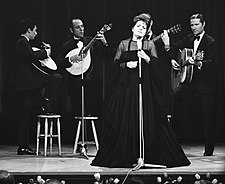Amália Rodrigues
| ||||||||||||||||||||||||||||||||
Read other articles:

Citizens of Latin American countries For the pan-ethnic demographic group in the United States, see Hispanic and Latino Americans. Latin AmericansTotal population680,000,000or more (in 2021)[1][2][3]Regions with significant populationsLatin America628,000,000[1][2] Brazil214,326,223 Mexico126,705,138 Colombia51,516,562 Argentina45,276,780 Peru33,715,471 Venezuela28,199,867 Chile19,493,184 Guatemala17,608,483 Ecu…

County in North Carolina, United States Not to be confused with Madison, North Carolina. County in North CarolinaMadison CountyCountyMadison County Courthouse in Marshall FlagSealLocation within the U.S. state of North CarolinaNorth Carolina's location within the U.S.Coordinates: 35°52′N 82°43′W / 35.86°N 82.71°W / 35.86; -82.71Country United StatesState North CarolinaFounded1851Named forJames MadisonSeatMarshallLargest municipalityMars HillArea •…

Questa voce sull'argomento politici italiani è solo un abbozzo. Contribuisci a migliorarla secondo le convenzioni di Wikipedia. Segui i suggerimenti del progetto di riferimento. Augusto Rezzonico Senatore della Repubblica ItalianaDurata mandato1987 –1992 LegislaturaX GruppoparlamentareDemocratico Cristiano CoalizionePentapartito CircoscrizioneLombardia CollegioBusto Arsizio Incarichi parlamentari Membro dell'8ª Commissione permanente (Lavori pubblici, comunicazioni); …

Questa voce o sezione sull'argomento edizioni di competizioni calcistiche non cita le fonti necessarie o quelle presenti sono insufficienti. Puoi migliorare questa voce aggiungendo citazioni da fonti attendibili secondo le linee guida sull'uso delle fonti. Segui i suggerimenti del progetto di riferimento. Serie D 1979-1980 Competizione Serie D Sport Calcio Edizione 21ª Organizzatore Lega Semiprofessionisti Luogo Italia Partecipanti 108 Formula 6 gironi all'italiana Risultati Promozio…

1998 single by Brandy For other uses, see Have You Ever (disambiguation). Have You Ever?Single by Brandyfrom the album Never Say Never B-sideHappyReleasedOctober 6, 1998 (1998-10-06)[1]Studio Chartmaker (Malibu, California) Record Plant (Hollywood, California) GenrePop[2]Length4:33LabelAtlanticSongwriter(s)Diane WarrenProducer(s)David FosterBrandy singles chronology Top of the World (1998) Have You Ever? (1998) Angel in Disguise (1999) Music videoHave You Ever on Y…

此條目可参照英語維基百科相應條目来扩充。 (2021年5月6日)若您熟悉来源语言和主题,请协助参考外语维基百科扩充条目。请勿直接提交机械翻译,也不要翻译不可靠、低品质内容。依版权协议,译文需在编辑摘要注明来源,或于讨论页顶部标记{{Translated page}}标签。 约翰斯顿环礁Kalama Atoll 美國本土外小島嶼 Johnston Atoll 旗幟颂歌:《星條旗》The Star-Spangled Banner約翰斯頓環礁地�…

Dennis K. StanleyBiographical detailsBorn(1906-04-14)April 14, 1906Aylesbury, EnglandDiedMay 29, 1983(1983-05-29) (aged 77)Gainesville, Florida, U.S.Playing careerFootball1926–1928Florida Position(s)EndCoaching career (HC unless noted)Football1929Daytona Beach HS (FL)1930Andrew Jackson HS (FL)1931–1932Florida (assistant)1933–1935Florida1936–1938Florida (ends)1939–1946Duke (ends)Tennis1932–1940FloridaTrack and field1934–1936Florida Head coaching recordOverall14–13–2 (colleg…

Class of American destroyer escorts USS Rudderow Class overview NameRudderow class Builders Bethlehem Hingham, MA Bethlehem Fore River, MA Charleston Navy Yard, SC Defoe Shipbuilding, MI Philadelphia Navy Yard, PA Operators United States Navy Republic of China Navy Colombian National Navy Republic of Korea Navy Mexican Navy Preceded byEdsall class Succeeded byJohn C. Butler class Built1943–1944 In commission1943–1992 Planned252 Completed22 Cancelled180 Pres…
2020年夏季奥林匹克运动会波兰代表團波兰国旗IOC編碼POLNOC波蘭奧林匹克委員會網站olimpijski.pl(英文)(波兰文)2020年夏季奥林匹克运动会(東京)2021年7月23日至8月8日(受2019冠状病毒病疫情影响推迟,但仍保留原定名称)運動員206參賽項目24个大项旗手开幕式:帕维尔·科热尼奥夫斯基(游泳)和马娅·沃什乔夫斯卡(自行车)[1]闭幕式:卡罗利娜·纳亚(皮划艇)[2…

POSB BankJenisAnak perusahaanIndustriPerbankanDidirikan1 Januari 1877; 147 tahun lalu (1877-01-01)Kantorpusat SingapuraTokohkunciPeter Seah, KetuaPiyush Gupta, CEOProdukJasa keuanganIndukDBS Bank (100%)Situs webwww.posb.com.sg POSB Bank (atau POSB) (Hanzi: 邮政储蓄银行) adalah sebuah bank di Singapura yang menawarkan layanan perbankan konsumen dan merupakan bank lokal tertua di Singapura yang masih beroperasi. Bank ini didirikan pada 1 Januari 1877 di Gedung Kantor Pos Umum, Raffl…

American actress Marjorie DawDaw, 1924BornMarguerite E. House(1902-01-19)January 19, 1902Colorado Springs, Colorado, U.S.DiedMarch 18, 1979(1979-03-18) (aged 77)Huntington Beach, California, U.S.OccupationActressYears active1914–1929Spouses A. Edward Sutherland (m. 1923; div. 1925) Myron Selznick (m. 1929; div. 1942) Children1 Marjorie Daw (born Marguerite E. House;[1] Janu…

American machine tool builder This article is about machine tool manufacturer. For other uses, see Haas (disambiguation). This article relies excessively on references to primary sources. Please improve this article by adding secondary or tertiary sources. Find sources: Haas Automation – news · newspapers · books · scholar · JSTOR (October 2013) (Learn how and when to remove this message) Haas Automation, Inc.Company typePrivateIndustryCNC Machine Tools, …

施仙奴Cicinho 個人信息全名 Cícero João de Cézare Valencia出生日期 (1980-06-24) 1980年6月24日(43歲)出生地點 巴西聖保羅身高 1.72米(5英尺71⁄2英寸)位置 右後衛職業俱乐部*年份 球隊 出场(进球) 1999-20002001-20032001-20022003-20052005-20072007-2012200920102012-20132013-20162017-2018 保地花高RP 明尼路→保地花高 圣保罗皇家馬德里羅馬→圣保罗 →維拉利爾利斯菲體育會施華斯堡巴西人足球俱…

Закон о правах человека в КНДРангл. North Korean Human Rights Act of 2004 Вид Федеральный закон Государство США Номер 108–333 Принятие Сто восьмым Конгрессом США Одобрение Палатой представителей США 21 июля 2004 годаСенатом США 28 сентября 2004 года Подписание Президентом США Джорджем Буше…

Part of a series onAfrican Americans History Periods Timeline Atlantic slave trade Abolitionism in the United States Slavery in the colonial history of the US Revolutionary War Antebellum period Slavery and military history during the Civil War Reconstruction era Politicians Juneteenth Civil rights movement (1865–1896) Jim Crow era (1896–1954) Civil rights movement (1954–1968) Black power movement Post–civil rights era Aspects Agriculture history Black Belt in the American South Business…

Public corporation that operated Japanese national railway network from 1949 to 1987 JNR redirects here. For other uses, see JNR (disambiguation). Japanese National RailwaysLogoFlag, incorporating the JNR corporate emblem (in red)Native name日本国有鉄道Romanized nameNihon Kokuyū TetsudōNippon Kokuyū TetsudōCompany typeStatutory corporationIndustryTransportationPredecessorJapanese Government RailwaysFoundedJune 1, 1949 (1949-06-01)FounderGovernment of Japan by order of th…

المجلس البريطاني الأيرلندي البلد المملكة المتحدة المقر الرئيسي إدنبرة، اسكتلندا1 تاريخ التأسيس 2 ديسمبر 1999؛ منذ 24 سنة (1999-12-02) النوع منظمة حكومية دولية الوضع القانوني اتفاق الجمعة العظيمة منطقة الخدمة الجزر البريطانية2 العضوية أيرلندا (موقّع)المملكة المتحدة (م�…

Criteria for bowl games participation The 2003 Navy Midshipmen football team leaving the field after their seventh win of the season, assuring them bowl eligibility. Bowl eligibility in college football at the NCAA Division I FBS level is the standard through which teams become available for selection to participate in postseason bowl games. When a team achieves this state, it is described as bowl-eligible. For nearly a century, bowl games were the purview of only the very best teams, but a stea…

Sporting event delegationRomania at the1964 Winter OlympicsIOC codeROUNOCRomanian Olympic and Sports CommitteeWebsitewww.cosr.ro (in Romanian, English, and French)in InnsbruckCompetitors27 (men) in 4 sportsFlag bearerIon PanțuruMedals Gold 0 Silver 0 Bronze 0 Total 0 Winter Olympics appearances (overview)19281932193619481952195619601964196819721976198019841988199219941998200220062010201420182022 Romania competed at the 1964 Winter Olympics in Innsbruck, Austria. The nation returned to…

Литературный институт имени А. М. ГорькогоЛитинститут Международное название Maxim Gorky Literature Institute Головная организация Министерство культуры Российской Федерации[1] Год основания 1933 Тип федеральное государственное бюджетное образовательное учреждение высшего образо…





